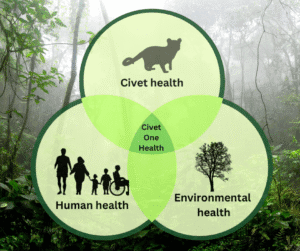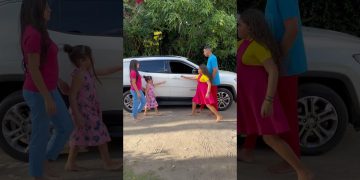Wild Welfare is proud to announce a transformative Partnership Alliance with The Civet Project Foundation. This marks a critical milestone in The Civet Project Foundation’s evolution from a volunteer-led initiative to a professionally staffed and sustainable charity. This strategic partnership has enabled the recruitment of three UK-based staff members, including a Communications Officer and a Programs Administrator, to support the charity’s expanding operations. Jes Hooper, founder of The Civet Project Foundation, has been appointed as the organisation’s first Chief Executive Officer (CEO). She is succeeded by Zak Showell as Chair of the Board.

Civet One Health Venn Diagram displays the important overlap between Civet Health, Environmental Health and Human Health.
Additionally, the Board of Trustees has been strengthened with the appointment of new members including Heidi Quine (Country Director for Animals Asia in Vietnam) and Jack Williams (Conservation & Development Coordinator at Dudley Zoo & Castle). With over 25 years’ experience in animal welfare and conservation, Heidi has lived in Vietnam since 2015 and has led efforts to end bear bile farming, improve animal welfare standards, and build local capacity through training and leadership development. She now oversees Animals Asia’s two bear rescue centres, ethical elephant experience program, and the campaign to end the consumption of dogs and cats. Heidi’s expertise will be key for the development of the Civet Project’s new flagship program ‘Civet One Health’ which is dedicated to ending the commercial farming of civets for civet coffee and meat in Vietnam. Jack’s experience with fundraising and supporter engagement via his role at Dudley Zoo & Castle will secure the Civet One Health program’s long term viability for protecting civets, the environment, and public health in Vietnam.
Understanding Civet Coffee: A Hidden Crisis

Civet coffer or Kopi luwak.
Civet coffee, also known as kopi luwak, is marketed as the world’s most expensive coffee. It is produced by feeding civets coffee cherries, which are later collected from their feces, cleaned, and roasted. What was once a rare, naturally occurring process has evolved into an industry of exploitation. Today, thousands of Asian palm civets are held in cramped, barren cages across Southeast Asia to supply this luxury market. These wild animals suffer immense psychological and physical distress. The farming practices not only pose serious animal welfare concerns, but also threaten biodiversity by removing civets from their ecosystems, where they play vital roles in seed dispersal and forest regeneration. Crucially, civet farming also presents significant public health risks. The species has been linked to past zoonotic disease outbreaks, including the original SARS coronavirus. The Civet One Health initiative will address these intertwined animal, environmental, and human health concerns through science-led advocacy, education, and sustainable policy development.
A Vision for the Future
The support of Wild Welfare has enabled The Civet Project Foundation to secure critical operational infrastructure and expand its reach in civet-producing regions, particularly Vietnam. With a newly professionalised team and a strengthened governance structure, the charity is positioned to drive meaningful change through research, policy, and public engagement.
Zak Showell, Chair, commented “We are incredibly thankful for Wild Welfares support. Our alliance has so far enabled the production of our award winning film ‘From Rare to Reckless’ highlighting the plight of civets in civet coffee farms, and we’ve raised the profile of civets around the world via World Civet Day. Now, to go from just an idea to having employed staff in under 2 years is an incredible achievement for our charity, which we wouldn’t have done without Wild Welfares support.”
Simon Marsh, Executive Director of Wild Welfare, added: “We are delighted to have formed this Alliance with The Civet Project as this assists Wild Welfare achieve our mission, expanding our reach and impact, as well as supporting the growth of this critically placed charity to end the suffering of civets and develop healthier and sustainable communities across Southeast Asia.”
About The Civet Project Foundation
Established as a Charity Incorporated Organisation in 2023, The Civet Project Foundation is the only charity in the world solely dedicated to civet species protection. The organisation aims to protect wild civets from exploitation in the coffee, meat, and exotic pet trades through research, education, and policy reform grounded in the One Health framework.
For media inquiries, interviews or further information, please contact: jes@thecivetproject.com
ENDS
Wild Welfare is devoted to improving the welfare of captive animals across the world. You can support our efforts by sharing this article, signing up to our newsletter, following our social media accounts (Facebook and Instagram), or by making an online donation. Every small contribution can help us to develop our vital accessible animal resources. Thank you.
Notes to Editors
For more information or interview requests please contact Wild Welfare on communications@wildwelfare.org
Wild Welfare is a global organisation committed to improving animal welfare for captive wild animals. By uniting the world’s leading zoos, zoo associations and animal welfare organisations, we build trusting partnerships that help provide long-term solutions to critical wild animal welfare issues.
Our vision is to end the suffering of captive wild animals around the world and ensure full and sustainable protection is given to all animals in human care. Find out more at wildwelfare.org. Registered charity in England (no.1165941).









Discussion about this post